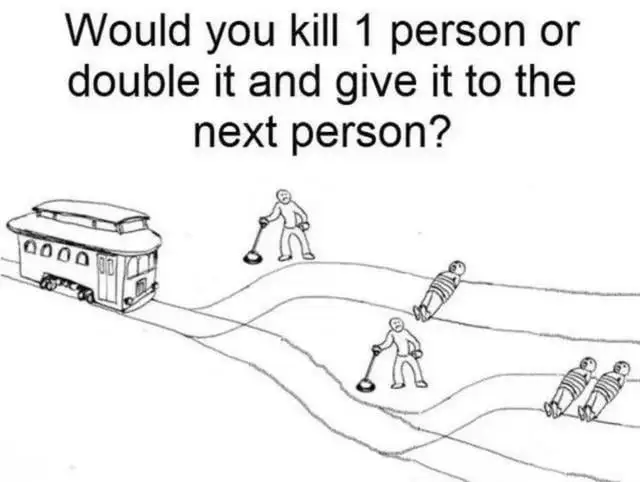Recursion
Recursion


Recursion


You're viewing a single thread.
If we all collectively agree to just pass it on, then either:
So yeah, I say pass it on.
Except that somewhere down that chain someone is almost certainly going to choose to kill people, so by passing the trolley on down to them you're responsible for killing a lot more than if you ended it right now.
And since every rational person down the line is going to think that, they'll all be itching to pull the "kill" lever first chance they get. So you know that you need to pull the kill lever immediately to minimize the number of deaths.
Only the person pulling the lever is responsible for his/her action though. There is a difference between passively passing on and actively murder someone
Dentological ethics: you have a duty to not murder people, so you don't pull the lever
Utilitarian ethics: pulling the lever will kill less people
In this case it isn't even a guarantee that anyone has to die as the problem is presented, the tram can just continue to be passed along. The default setting for the lever is "go to next" so to not pull the lever is easier both physically and morally.
The individual that pulls the lever is the same individual that would take action to harm others for no benefit, and even in real life I can't morally take responsibility for a person who runs over a child by purpose after I let his/her car merge in front of me just before a school crossing
If I hand a machete to Jason Voorhees I think I'm at least partly responsible for the people he hits with it. I know what he's going to do with that thing.
Except you're not passing a machete to Jason Voorhees. That would be "double it and pass it to the next person who you know is going to pull the lever."
You're passing a machete to the next person in line. You don't know who that is. They may or may not pass the machete down the line. Considering I would not expect a person chosen at random to kill someone when handed a machete, it seems unethical for me to kill someone with a machete just to prevent handing it to someone else.
I know Jason is somewhere down that line I'm handing the machete off to. And the farther down the line he is the more people he's going to kill.
There are only 33 people in the line though.
Either you get to 33 and there are no more and the track just ends or it’s “nuke the planet” or dont for everyone else above 33.
Or it keeps doubling even well after its surpassed the human population, and we all have to keep hitting "pass" in turns forever, and if even a single person gives up then boom.
That's only if he's next in line though. If you pass a machete to someone who might one day eventually pass it onto him, is that as bad? I suppose at some point there's an ethical cutoff lol
The farther away he is the worse it is because the more people he gets to kill. If for some reason I absolutely had to pass the machete down the line then the best case is for the very next person I hand it to to be Jason. But even better if it's me.
In this case you don't hand him a machete, instead you murder someone innocent to prevent possible murders in the future by a third party
I guess it comes down to the weight you give the word "possible" in your sentence. If possible means extremely likely (and there are logical reasons to believe so) then taking responsibility makes sense.
I guess then the issue would be: do you ever find out the result of your actions? If no, then I guess it's sort of a "glass half empty/full" kind of thing, because you could just pass it on and assume the best and just go live your life quite happily.
Although if you did find out the result, imagine being first, pulling the lever and then finding out nobody else would have.
If it's infinite, you'd basically be gambling that no evil person exists.
If it's infinite (up to the current human population), we're all tied up on the tracks. Unless we're leaving out the exact number of people that would bring it to approximately the full population, I guess.
As long as I'm not on the tracks, I'll take the hit and kill one instead of risking a potential genocide.